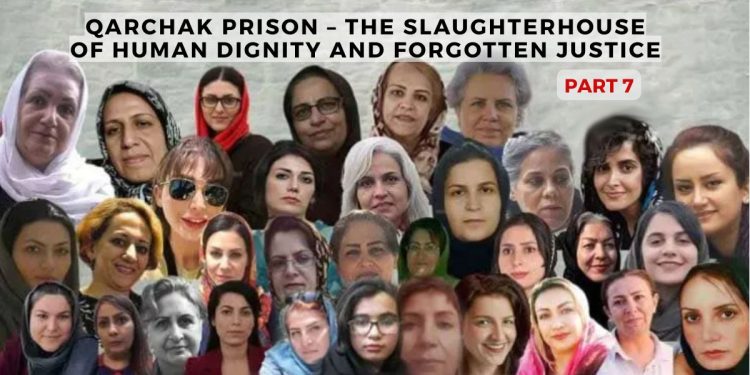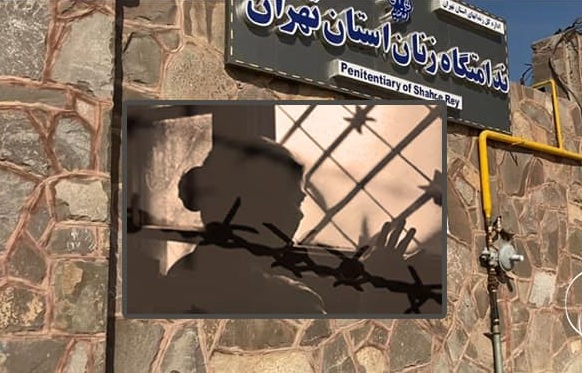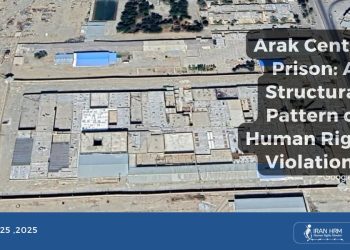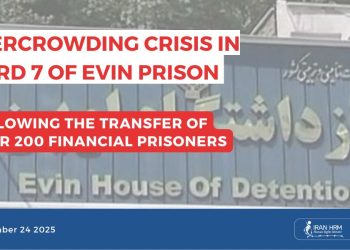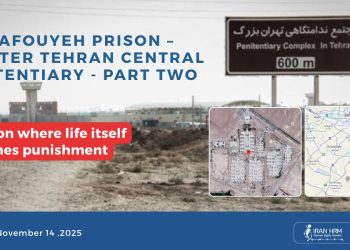Qarchak Prison in Varamin once again became a stage for women’s resistance. This time, in response to the sudden and secret executions of two political prisoners, Mehdi Hassani and Behrouz Ehsani, women prisoners in Qarchak held a protest gathering to express their anger and opposition to the regime’s machinery of death. This act of defiance, carried out inside one of Iran’s harshest and most insecure prisons, reflects the voices of women who have not surrendered to the gallows but have instead expressed solidarity with other political prisoners through chants, songs, and hunger strikes.
Event: Protest in the Heart of Qarchak
On the evening of Saturday, July 27, 2025, women prisoners gathered in the quarantine corridor of Qarchak’s women’s ward to hold a memorial and protest ceremony. The event honored Mehdi Hassani and Behrouz Ehsani, two political prisoners executed at dawn the same day in Qezel Hesar Prison.
The ceremony began with symbolic songs such as “Khoon-e Arghavanha” (“The Blood of Redbuds”), followed by chants openly declaring their opposition:
• “We stand until the death penalty is abolished – until the end”
• “Death to the dictator”
• “The executioner regime must be overthrown”
These slogans, long heard in Iran’s streets and prisons, once again echoed within Qarchak’s walls. Their significance lies in the fact that, despite inhumane living conditions, heavy security pressure, and the risk of punishment, women prisoners in Qarchak raised their voices publicly.
Link to the Repression in Qezel Hesar
The protest in Qarchak was more than a memorial – it was a direct response to simultaneous repression in Qezel Hesar Prison. On July 26, one day before the executions, special guard units stormed Ward 4 for political prisoners. They brutally beat inmates, handcuffed and shackled them, placed bags over their heads, and transferred them to solitary confinement.
That same night, Saeed Massouri, one of Iran’s longest-serving political prisoners and a symbol of 25 years of resistance, was suddenly exiled to Zahedan Prison. Many saw this transfer as part of the regime’s punitive policy to break political prisoners’ solidarity.
The timing of the executions, the violent raid, and the exile demonstrated the regime’s attempt to crush collective resistance at its roots. Yet the protest of women in Qarchak proved that even such simultaneous repression cannot silence the voice of resistance.
“Tuesdays No to Execution”: A Shared Circle of Resistance
At the end of their protest, women in Qarchak once again reaffirmed their support for the “Tuesdays No to Execution” campaign. This initiative, launched in recent years by political prisoners, is a weekly movement. Every Tuesday, prisoners across Iran protest executions through hunger strikes, collective statements, and symbolic acts.
In Qarchak, women have refused prison meals every Tuesday, reminding the world that death sentences are illegitimate and cannot extinguish the freedom movement. This campaign has gradually become a nationwide symbol of resistance to executions, drawing support from families, human rights activists, and international organizations.
Legal Analysis
The protest of women in Qarchak can be viewed through several legal principles:
• Right to freedom of expression (Article 19, ICCPR): Prisoners have the right to express opposition.
• Right to peaceful assembly (Article 21, ICCPR): Even in prison, detainees must be able to protest peacefully.
• Prohibition of collective punishment and gender-based discrimination: The intensified repression of women violates the UN Nelson Mandela Rules.
Conclusion and Call to Action
The protest of women in Qarchak in July 2025 was a living declaration against the cycle of state violence and executions. They showed that even in the depths of repression and deprivation, voices of resistance can survive through chants, songs, and hunger strikes.
We call on the United Nations, the European Union, and all human rights organizations to:
• Condemn the new wave of executions in Iran.
• Demand the immediate halt of death penalty implementations.
• Give special attention to the situation of political prisoners in Qarchak and Qezel Hesar.
• Support the “Tuesdays No to Execution” campaign as part of the global human rights agenda.
With empty hands but collective resolve, the women of Qarchak have delivered the message of “No to Execution” to the world – a voice that must not be silenced within prison walls.

